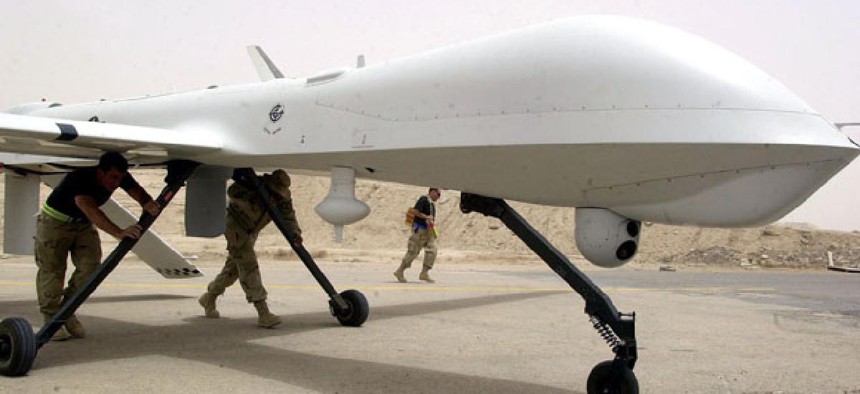Baby steps: The drone industry's code of conduct skips over key questions

Air Force
A trade group's set of best practices is a start, but unmanned vehicles -- like the car and airplane before them -- will require revising old laws.
The last several months were supposed to be good times for the makers of unmanned aerial systems, popularly known as "drones." Business is booming and theirs is one of the few parts of the aerospace industry not shaking in its boots at impending defense budget cuts. And the $2.3 million spent on lobbying Congress finally seems to have paid off. In February, Congress ordered the FAA to figure out an action plan to open up the national air space to unmanned systems (currently, only those with special agreements, such as for Border Patrol, are allowed) by 2015, as well as set up six experimentation locales.
This will put an already strong business on steroids, akin to what the development of the Internet did for the computer industry. Rather than just selling to the Pentagon, the new clients might range from the more than 21,000 state and local law enforcement departments to farmers, journalists, and more, as they find new and innovative uses for unmanned systems, from overhead surveillance to crop-dusting.
The problem is that what appeared to be good news for the industry instead turned into a public-relations nightmare. Both left and right came together in condemnation and worry over the implications of this move, especially on privacy rights. Perhaps the most extreme example was when Charles Krauthammer, the right-wing columnist and Fox News commentator, reacted to the news by saying, "I'm going to go hard left on you here, I'm going ACLU" and calling for an absolute ban: "I don't want regulations, I don't want restrictions, I want a ban on this." He then swung back to the traditional right, adding, "The first guy who uses a Second Amendment weapon to bring a drone down that's been hovering over his house is going to be a folk hero in this country."
Even worse for the industry, policymakers began to take seriously some of the stories about drones run amok that went viral on the Internet. Some of those stories turned out to be false, such as when Nebraska's congressional delegation complained to the EPA about federal government drones illegally "spying" on farmers, despite the story having no factual basis. Soon, legislators at the state and federal levels were racing to submit bills to roll back the planned domestic drone boom.
Faced with the backlash, the trade group for the industry, the Association for Unmanned Vehicles Systems International (AUVSI), which had originally taken credit for literally writing the exact language used in the FAA bill, tried to stem the bleeding with a classic move from the bad-press playbook. Last week, it issued an industry "code of conduct."
Read the full story at The Atlantic.
Read the full story at The Atlantic.
NEXT STORY: Microtasking Mania?





